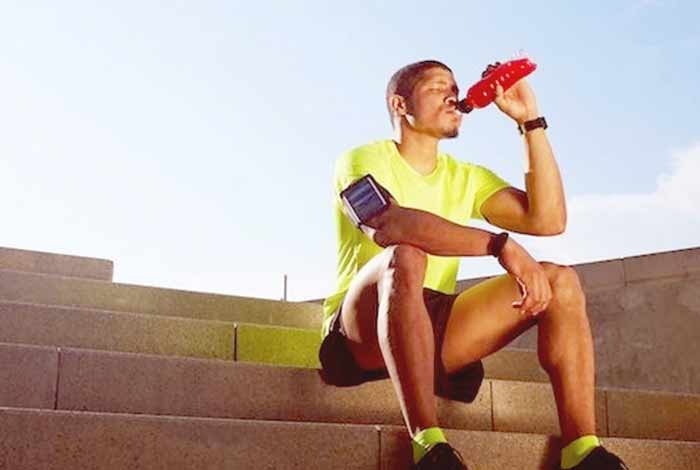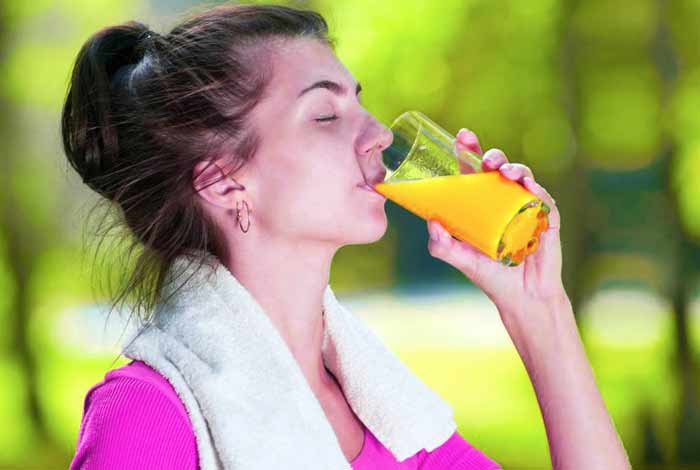
Sports Drink or Water – Which Is Better and For Whom?

If you occasionally watch sports, you might have seen sportspersons sipping on some bright colored liquids in between or after their events. Well, these are nothing but sports drinks, which is a big business around the globe and an important part of athletes’ lives.
Many people out there believe that sports drinks are nothing short of a miracle drink, which can improve a person’s physical performance. However, a few regard them as just plain marketing gimmick and suggest that sticking to only water is the best option.
Which Is Better?
Water accounts for the majority of the body weight and is utmost important for body’s proper functioning. Your body is continuously losing water in the form of air you exhale and through your skin, in addition to sweat, feces and urine.
To promote health and to cover up for these losses, it is recommended to drink water and fluids all day long.
Although water requirements vary from person to person, the recommended dose is around 125 ounces for men and 91 ounces for women.
Major Constituents of Sports Drinks:
Sports drinks mainly contain water, but these have a few other ingredients, including electrolytes and carbs. All of these ingredients are supposed to boost physical performance. Generally, sports drinks contain 6 to 8 % of carbohydrates in the form of sucrose, fructose or glucose.
some sports drinks are also carb-free or have low carb content to appeal to those, who need only water and electrolytes without added sugar or calories.
Minerals or electrolytes are also crucial for the body’s normal functioning as they are electrically charged. Sodium and potassium are generally found in these energy drinks.
There are various brands available in the market, but they are almost similar when it comes to their effectiveness.
Sports Drinks’ Benefits
Sports drinks contain electrolytes, minerals and water. Each of these is important for various aspects of exercises. Electrolytes and water are considerably lost during physical activities. It is therefore important to replace them while indulging in exercising for long durations, according to a study.[1]
Consuming carbohydrates during or before physical exercises can actually reduce your body’s own carbohydrate consumption.
Simply put, sports drinks are designed to provide these essential ingredients to the body, so as to improve physical stamina and facilitate recovery.
For short-duration exercises, the efficacy of sports drinks is still unclear. In a study, cyclists, who consumed sports drinks, performed better by nearly 2% than those, who were given placebo, during an hour of intense cycling session.[2]
However, for short-term activities like jumping, agility exercises and sprinting, sports drinks failed to show any observable benefits.[3] Similar results were found in case of weight training with respect to the effectiveness of sports drinks.[4]
For intermittent exercises and team sports, where there are alternate periods of rest and intense activity, sports drinks improved the performance and reduced fatigue; according to a study.[5]
Several other studies have also shown that improved performance in rugby, soccer and prolonged cycling after the consumption of sports drinks. Surprisingly, these drinks also improved performance when consumed during extended activities like cycling and running, that usually last for 1 to 4 hours or even longer.
Researchers believe that the improvement in performances is because sports drinks provide carbohydrates and prevent dehydration. The amount of carbohydrate you require depends on the duration of the exercise.
How To Know If Sports Drinks Would Benefit You?

Consider the duration and intensity of your workout session, it is important to know if you actually require a sports drink. If you indulge in easy to moderate exercises like jogging, running and weight training for less than an hour, you might need not require sports drinks. However, if you still want to consume sports drinks, you must consume lesser amounts – not more than 30 gram of carbs – for a 1- to 2-hour workout session.
In case you are trying to lose weight, pay attention to the calories you are consuming through these sports drinks. It is better to avoid them altogether or consume them in extremely smaller quantities.
Fortunately, there are other alternatives that can hydrate your body as much as any sports drink. A study revealed that orange juice, oral rehydration solution (ORS) and milk provide maximum hydration.[6] Moreover, there was no significant difference between hydration provided by tea, water, cola and sports drinks. Surprisingly, coffee and tea – usually touted as dehydrating beverages – actually hydrated the body much similar to water does.
Well, this shows that myriads of beverages can hydrate you throughout the day by contributing to your daily fluid requirements. With their availability in an array of tempting flavors, several sports drink might make people consume them in larger quantities. This can possibly help those, who are at a risk of dehydration.
To conclude, it can be aid that sports drinks can be beneficial to athletes and extremely active individuals, but are of no good to most people. Nevertheless, many other drinks or at times, just plain water can be a better alternative.










